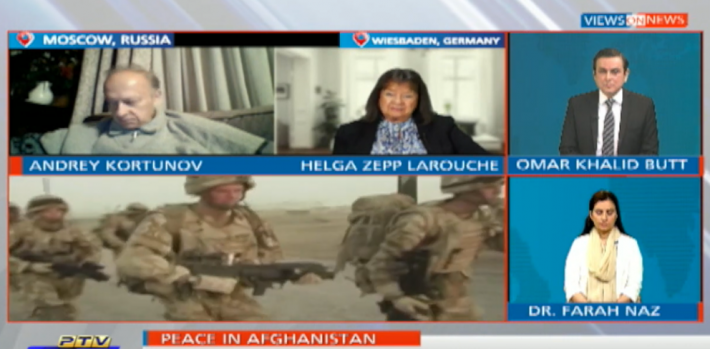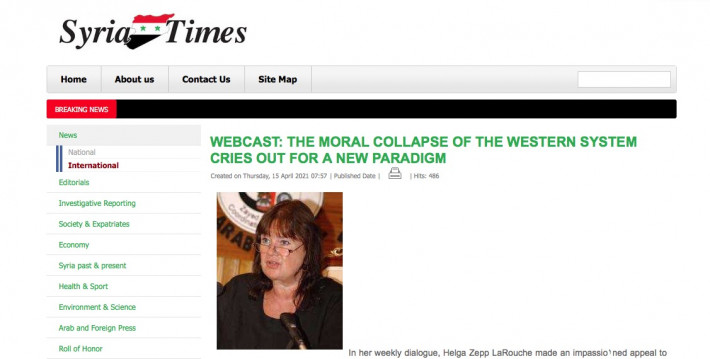China’s CGTN conducted two interviews with Schiller Institute chairwoman Helga Zepp-LaRouche on the celebration of eight years of the Belt and Road Initiative, one for with the “Dialogue Weekend” program and the second with “Global Business.” Here are the transcripts:
Dialogue Weekend
LI QIUYUAN: Welcome to this edition of Dialogue Weekend: I’m Li Quiyuan.
In the fall of 2013, while on visits to Kazakhstan and Indonesia, Chinese President Xi Jinping unveiled the plan to build the Silk Road Economic Belt and 21st Century Maritime Silk Road, otherwise known as the Belt and Road Initiative. Eight years on, how is the project progressing, and how has it helped all those involved? And what obstacles have been overcome during the construction? To review the last eight years of the BRI, I’m glad to be joined by Prof. John Gong from the University of International Business and Economics; and Miss Helga Zepp-LaRouche, founder and president of the Schiller Institute. Great to see you both.
Why don’t I start with Professor Gong first? Explain to us some context here: Why try to propose this, building this New Silk Road in the very beginning, and also why did the President announce this while travelling abroad? And also, eight years on, eight years into this project, where are we now, as far as its construction?
PROF. JOHN GONG: Hi Qiuyuan, you’re nice to have me here. It’s a long question, but let me first start by saying what the Belt and Road Initiative is not: It is not a geopolitical play, it’s not a geostrategic play, it’s not intended to seek a spread of influence. It’s mostly an economic play. There are several reasons why China started this initiative. I think the broader context is that this is a time when Chinese companies started to expand overseas, started to build a global supply chain, and in this course, Chinese companies quickly started to discover that the markets they’re mostly activating, these are the developing countries, the third world countries, they are handicapped by basic infrastructure for things like railways, port facilities, electricity network, telecom network—all these things are lacking for the Chinese companies to operate properly in these markets. And there’s a mutual benefit in developing these countries’ basic infrastructure. And this is also the time, when there was an access capacity in the basic building materials, mostly useful infrastructure buildouts for things like cement, steel, those things. We’re talking about a time in 2013, 2012.
And I would also mention this is also a time when China’s foreign exchange reserve was at an all-time high, and we would like to see the foreign exchange reserve at close to $4 trillion at the time, mostly sitting in the United States, buying American government’s Treasury bills and bonds.
So all these reasons combined contributed to the very natural evolution to using that money, using that excess capacity, and using the capabilities of Chinese companies of building infrastructure to help those developing countries to develop those projects. And I think this is the broader context: it work for both ways, and it works in particular in a way to benefit the host countries where the Chinese companies are operating, and these infrastructure projects are taking place.
LI: Helga, let me get your take on this: How do you evaluate the progress being made in the past eight years regarding this initiative?
HELGA ZEPP-LAROUCHE: Well, I think it’s the most impressive infrastructure project in the history of all of mankind. And China for the first time has given the developing countries the chance to overcome poverty and underdevelopment. And if you look at the progress, there is now the China-Laos high-speed rail project, which is fantastic. It will be extended to Thailand, and beyond. And soon, the previously not so developed country, like Laos, will have a high-speed rail system, which Europe and the United States can only dream of!
Then you have the [China-Pakistan Economic Corridor] CPEC treaty, the Middle Corridor, all these projects in Central Asia, all these investments in Africa. So I think it has brought in an incredible shift in the strategic situation, by overcoming underdevelopment, for the first time, for all of these countries. So I think, despite all the opposition, I think it’s a great success.
LI: But now after all of China’s investments in Africa, we once again are hearing criticism or accusations of China setting so-called “debt traps” for the countries participating in the BRI. This is the most frequent criticisms we’ve heard about this initiative. Professor Gong, talk to us about it: Beijing has made it clear that this initiative is by no means a debt trap. What has been done by China to support its claim?
GONG: We have to go back to the origin of the so-called “debt trap” theory. I think it originated in India with respect to, in particular, the port project in Sri Lanka. The idea is basically conspiracy theory….
LI: Now, we’ve seen the pandemic COVID-19 causing massive disruptions and damage to economic activities all around the world including the global supply chain, such as thousands of containers sitting on the Los Angeles docks, waiting for truckers and warehouse personnel to transport and deliver goods. It would seem that the world desperately needs an economic boost now, more than ever. But, Helga, do you see the BRI being it, providing great opportunities for corporations, for countries involved? Could they benefit from a smoother and more efficient global trade infrastructure?
ZEPP-LAROUCHE: Oh, yes. You have already all the countries of Asia, many in Africa, even of Europe—you have Portugal, Italy, Spain, Greece, the 16+1 East European countries that all are absolutely onboard of the BRI. But I think some of the so-called advanced countries like Germany, they would benefit the most if they would stop thinking in terms of geopolitical prejudices, because, for example, if they would join hands with China right now in the development of Afghanistan, which suffers the worst humanitarian crisis on the planet, and urgently needs to be integrated into the Belt and Road Initiative if it wants to ever have stability. So Germany, for example, is very concerned about the refugee crisis, and rather than building a wall around the EU outer borders, which is what the EU is considering right now—like the old Limes in the Roman Empire—I think the European countries, and hopefully also the United States, join hands; and they have a moral obligation because NATO countries were for 20 years in Afghanistan and they left the country in complete shambles. So, to reconstruct Afghanistan—and Haiti, and Syria, and Yemen, and all of these other countries that are in dire condition—if Germany and Europe would help and cooperate with China and the Belt and Road countries to develop Southwest Asia and Africa, there would be no refugee problem.
And I think we need a rethinking of this very, very urgently, because we have a tremendous moment in history. The Western financial system is not in good shape: You have signs of hyperinflation; the supply chain problem, you mentioned. So I think we need a rethinking. And the Schiller Institute is doing a lot of conferences and activities to convince the industrialized countries that it would be in their absolute self-interest to cooperate with the BRI and play a positive role in history.
LI: Helga, thank you for taking the time to talk to us. We appreciate your perspective.
Professor Gong, a final question on this part to you: Certainly great steps have been made on the BRI over the last eight years, but what lessons can we draw from these experiences? And what challenges has the project faced as it reaches out for wider cooperation?
GONG: Well, let me first supplement your previous question. Helga actually knows my position on this issue. I wrote a paper several years ago, talking about how America can actually benefit from the Belt and Road Initiative. The article’s title is “Make America Great Again—with Chinese Money.”
As a matter of fact, I actually as an opportunity to make a keynote speech at a conference organized by Helga, the Schiller Institute. [Create a New Epoch for Mankind • February 16, 2019, Morristown, NJ]
There could have been greater opportunities between China and the United States to address the infrastructure problems you have just mentioned. You talk about the supply chain hiccups, or these clogs at Los Angeles and Long Beach ports, all of these things can be substantially addressed by combining the capabilities of infrastructure buildouts, in China, together with investments in the United States. But unfortunately, that’s not going to happen.
Now, back to your question about lessons in the past, I think this is a perfect example to show that there are opportunities if China and other countries will just come together and cooperate, and purely think of this from an economic perspective and setting aside all these, you know, these talks about geostrategic, geopolitics lens, not seeing these things through that lens, I think there could be huge opportunities. There are tons of countries out there who indeed benefit from these infrastructure investments. So, I think the biggest lesson is, this is a purely economic play, and there will be mutual benefits deriving from this. And that let’s have both sides going to this in cooperative spirits should generate benefits for both countries.
And as well as the better exchanges, through human to human, people to people exchanges, and also economic benefits as well. So I think that’s the biggest lesson. And United States could have—I emphasize again, could have—benefitted immensely, if we go into this with, as we say, with a cooperative spirit. But unfortunately, it’s not happening.
Global Business
ANCHOR: For more on the Belt and Road Initiative, I want to bring in Helga Zepp-LaRouche, founder and president of the Schiller Institute, who’s now in Wiesbaden. Helga, welcome to the program. You know, President Xi Jinping saying the BRI is really about finding the biggest common ground for all, and I think it’s interesting to contrast that with what we hear oftentimes, from the West in terms of only working with like-minded countries. This is about working with all countries, large and small, to find their greatest common denominator.
So, Helga, at a time of such uncertainty, how important do you think is the BRI in terms of growing the economic pie for all?
HELGA ZEPP-LAROUCHE: I think it is, for sure, the most important strategic initiative on the planet right now. Because you say “uncertainty,” I mean, these uncertainties show for example, in the form of a hyperinflationary tendency: You see the energy prices skyrocketing, food prices, and we may actually head towards a hyperinflationary blowout of the entire system. And at such a moment, to have the Belt and Road Initiative which focusses entirely on the physical side of the economy, can actually become the absolute important savior for the world economy as a whole. So I think the existence of the Belt and Road Initiative is the most important initiative on the planet.
ANCHOR: And Helga, of course, one big topic that we are all talking about these days, from the public sector to the private sector, is how we can collectively tackle climate change. How do you see the Belt and Road Initiative really promoting sustainable and green development, especially for developing economies, who need more help in terms of making that green transition?
ZEPP-LAROUCHE: Well, you know, in the Glasgow COP26 summit, it became very clear that behind a lot of this climate policy, is also a Malthusian effort to prevent the developing countries from developing, and that has been expressed very clearly by India, Indonesia, Nigeria, which all did not go along with the program of Glasgow.
So I think China, on the other side, is offering especially cooperation in nuclear energy, which has a very high energy flux-density and therefore, is potentially the energy source for more developed economies. So I think the role of China and the BRI countries which all are going in the direction of promoting nuclear energy, also for the developing countries, are representing a very, very important alternative to the Malthusian policies coming from the financial centers in London and Wall Street.
ANCHOR: Hmm. So we have growing the economic pie for all, energy cooperation, green development, and of course, one other extension. Helga, of the BRI, is the Health Silk Road, and this is China aiding Belt and Road partner countries, by sharing medical knowledge about the coronavirus; last year providing medical aid as well, last year and this year. Help I believe will be a critical part of BRI cooperation going forward. How do you see this element of the Initiative developing, post-pandemic?
ZEPP-LAROUCHE: Well, I think it is very clear that China right now is helping many African countries to build vaccine production, so they can develop their own vaccine. I have been saying, since the outbreak of this pandemic, that it will only stop if we build a world health system: That means a modern health system in every single country. Because the idea to only take care of the rich countries with vaccines, and modern hospitals, does not work, because then the poor countries are left behind, and then the virus is mutating, and will come back and hit the entire human population.
So I think we have to have a very big emphasis on a modern health system in every single country: Which means modern hospitals—China has proven you can build a modern hospital in two weeks in Wuhan—but the developing countries need encouragement and help. They need energy, they need clean water, in order to do that. I think the most urgent ones right now are Afghanistan, Haiti, Syria and Yemen: These are the countries that need, urgently, international cooperation to build modern health systems, if they are supposed to survive. I have proposed something called “Operation Ibn Sina” which named after the great universal thinker of the Afghanistan region, from around the 10th century. And that could become the spearhead for a health system in every country in the Islamic world, but also for all the developing countries. And that’s the only way how the pandemic will stop, and future pandemics.
ANCHOR: Yes. And speaking about closing gaps all around in terms of the development gap, closing the energy and green development gap, what about the digital connectivity gap? The digital connectivity benefits provided by the BRI down the road can be absolutely huge, in terms of getting especially emerging and developing economies, really into the digital sphere. The pandemic, we’ve seen, has really accelerated digitization. How do you see the BRI boosting digital connectivity, and really helping to narrow the digital divide between developing economies and advanced economies?
ZEPP-LAROUCHE: I think the fact that China was able to deal with the pandemic so much better than almost every other country on the planet has to do with the fact that the health sector is largely digitalized, and contact tracing, smart cities integrated—I think that’s future.
The problem is, the West is opposing that because there is a difference: In China the population for the most part trusts the government, and thinks that these measures are being applied for the common good. In Western Europe, for example, or the United States, there is a deep mistrust between the population and the government, and therefore, there is a lot of opposition. But look at Germany, right now, or many European countries: The pandemic is exploding again. And that is, for sure, they are still using photocopy machines, and very archaic means to trace the pandemic. And if Europe would have the kind of digitalization like China we would be in much better shape.
So I think that is clearly the way to go, and hopefully, people start to rethink and correct a lot of prejudices which do not come from facts, but they come—for example, the U.S. Senate just agreed upon a strategic act, which spent several hundred million dollars every year to counter the so-called “influence” of China! If that money would be spent on building hospitals and building real infrastructure for the benefit of the people, the United States image would gain much more than from these kinds of measures!
So again, I can only hope there will be a rethinking and a lot of the prejudices which have been spread should be put into the garbage pile.
ANCHOR: Yeah, instead of spending trillions of dollars on never-ending wars in foreign lands, I think definitely that money, at least for the United States, can be better put towards working with other countries in terms of boosting development around the world. And of course, that’s what the BRI is about, is really focussing and emphasizing cooperation, especially in the world that we live in today, and our future generations will need that cooperation. We must see that through the BRI. Many thanks for sharing your thoughts with us, Helga. That’s Helga Zepp-LaRouche, founder and president of the Schiller Institute.


















